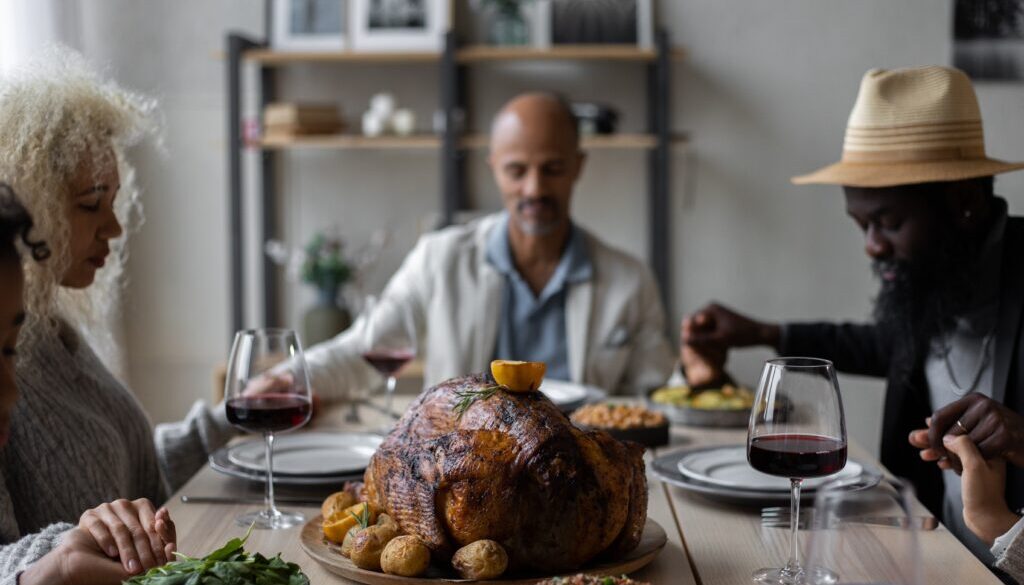Have a Merry, Bright & Simple Holiday
Gathering at the end of the year to celebrate special occasions and holidays is precious time with loved ones. When someone you care about or care for has Alzheimer’s disease, these times can also be stressful. Alzheimer’s is not uncommon, with one in nine older adults over age 65 living with this form of dementia. The fact that someone is cognitively impaired should not be a barrier to including them or their caregivers in holiday plans.
A change in routine can be exciting but also challenging for families managing dementia. To set everyone up for success, this month’s article explores:
- Why positivity matters.
- How to maximize intake by brightening holiday surroundings for those with dementia.
- What it means to keep things simple.
Merriment Matters
Brain capabilities in people living with Alzheimer’s change gradually. Reading comprehension and recall of names wane as do other aspects of memory. The ability to perform higher-level tasks such as balancing a checkbook or organizing a space declines; this is known as executive function. Decision-making without support also becomes difficult. Those experiencing these types of deficits often try to cover them up.
What is important to remember though is that the ability to sense emotion varies but remains intact in those with Alzheimer’s. Research shows that the temperament of another person or the mood of a situation is recognizable despite dementia. One’s capacity to do this varies, of course, based on the level of disease.
Interestingly though, identifying and carrying positive emotions forward is less impaired. Studies seek to explain this better, as the inability of a person with Alzheimer’s to process emotions is linked to poorer caregiver outcomes.
Here are some suggestions to keep a holiday occasion lighthearted:
- Provide a fun nonalcoholic drink or piece of candy to guests on arrival
- Play music – find out what the person enjoys listening to or has in the past
- Offer festive costume jewelry or other adornments for guests
- Ask the person to help! Involve them in straightforward tasks and give praise
- Organize the seating to include the person with dementia in the social group
- Identify a quiet or safe outdoor space in case the person needs a break
Brightness Helps Appetite
Illuminating a person’s eating space stimulates the senses and appetite. This is confirmed by Bailey Franklyn, registered dietician, and owner of Harvest Table Nutrition. She has years of experience working with older adults including those with cognitive impairment. As Alzheimer’s disease advances, not only can appetite diminish, but also the taste for food changes. This has to do with the affected areas of the brain.
A preference for sugary food is not uncommon and so maintaining a balanced diet is more challenging. “While a balanced diet is ideal, if your loved one is more interested in eating dessert than the main meal, it’s OK every once in a while. Provide gentle encouragement to prioritize more nutritious foods, but if they gravitate toward sweeter foods, eating something is better than nothing,” says Franklyn.
Below are some more tips from both Franklyn and the Alzheimer’s Association to optimize intake during the holiday season or anytime.
- Provide good lighting. Vision impairment may coexist in someone with dementia. Having a well-lit space while dining helps people with low vision or other impaired senses to distinguish between the plate and eating surface and between food choices.
- Consider plate color. Small-scale studies highlight the fact that plate color promotes food consumption. Red is a winning color.
- Incorporate music. Brightening the atmosphere with pleasing sound proved beneficial in studies. People who dined with music ate better than those without.
- Get an aquarium!? Perhaps it’s the calming effect of watching creatures move silently through water. Maybe it’s the reflection of light combined with the bright colors of large fish. Regardless, a small study showed that older adults with dementia who ate in the presence of an aquarium consumed 20% more after two weeks.
- Stay connected. It is important to make eye contact and offer light topics of conversation, but most importantly, just keep the person company. “Provide assistance throughout the meal if needed, or encouragement and reminders to take bites of food and sips of fluids,” advises Franklyn.
Additional tips to maximize intake:
- Add variety by displaying different colored foods against a contrasting background
- Play with texture to promote interest (e.g., slices of avocado versus guacamole)
- Allow the person to take their time and to eat with their hands even if messy
- If the person is losing weight, sneak in some extra calories when you can (e.g., add heavy cream to mashed potatoes or more butter to the vegetables)
Keeping It Simple
For the caregiver and host, keeping things simple is best. Simple means whatever is most manageable and least complicated. Easier said than done!
First and foremost, ask yourself…Should I even be taking my loved one out at this time or offering to host an event? Declining to participate in or attend a party can be done kindly and doesn’t require a lengthy explanation. Saying, “No, thank you,” is a complete sentence. Or stating that you have other plans – even if that is to stay in and read a favorite book while someone else takes your loved one out – is claiming important time for yourself.
As dementia care expert Teepa Snow advises, make sure as a caregiver you have connected with your support network and revved up your self-care! These are key holiday survival tactics.
What is a support network?
This is anyone or anywhere that reinforces your well-being and strength and replenishes your abilities. It could be family, friends or a therapist. It might be a class or church. It could be a caregiver support group or a hiking club. It should include a health care provider. Support is what shores up your capacity to remain whole so that you can be available to safely care for your loved one. Wholeness is physical, emotional, mental and spiritual.
What is self-care?
Glad you asked!
Self-care is self-love and self-advocacy. It is being careful not to overcommit which often means needing to process decisions with trusted people. It is receiving invitations and assessing honestly if you want to participate. It’s going where you want to go. It is saying yes to fun and healthy choices. It is going to see your medical provider for check-ups.
Instead of decking your own hall during the holidays, it may mean saving energy and resources by opting to go for a drive to enjoy community decorations or hanging ornaments at a family member’s home.
If you do attend or host a holiday event and want to include your loved one who has Alzheimer’s, here are some tips from age space to simplify things:
- Finger and bite-sized foods are often easiest; buy pre-cut items to minimize prep
- Keep the space including the dining area uncluttered
- Label food and let the person with dementia serve themselves
- Ask other friends or family to attend to your loved one for a time
Making the holiday merry and bright is possible without overcomplicating matters. Typically, this requires asking for help, which is not always easy but is almost always appreciated by those around you. When you devote most of your time in service to another, it is usually recognized, however, others may not be sure how to help you in return. Be brave and ask for what you need! Resources for support, self-care and caregiving are available. For more information, start with your local chapters of the Council on Aging or Alzheimer’s Association.

Dow Stick is a freelance health writer and nurse practitioner in Western North Carolina. She earned a Bachelor of Science degree in Biology from the University of Mary Washington and a Master of Science degree in Nursing from East Tennessee State University. Her experience as an advanced practice nurse includes adult primary care, hospice and palliative care, chronic disease management, and addiction medicine. Her interests are in the health and wellness of older adults as well as the advocacy and support of those living with dementia, especially her own 95-year-old grandmother.

